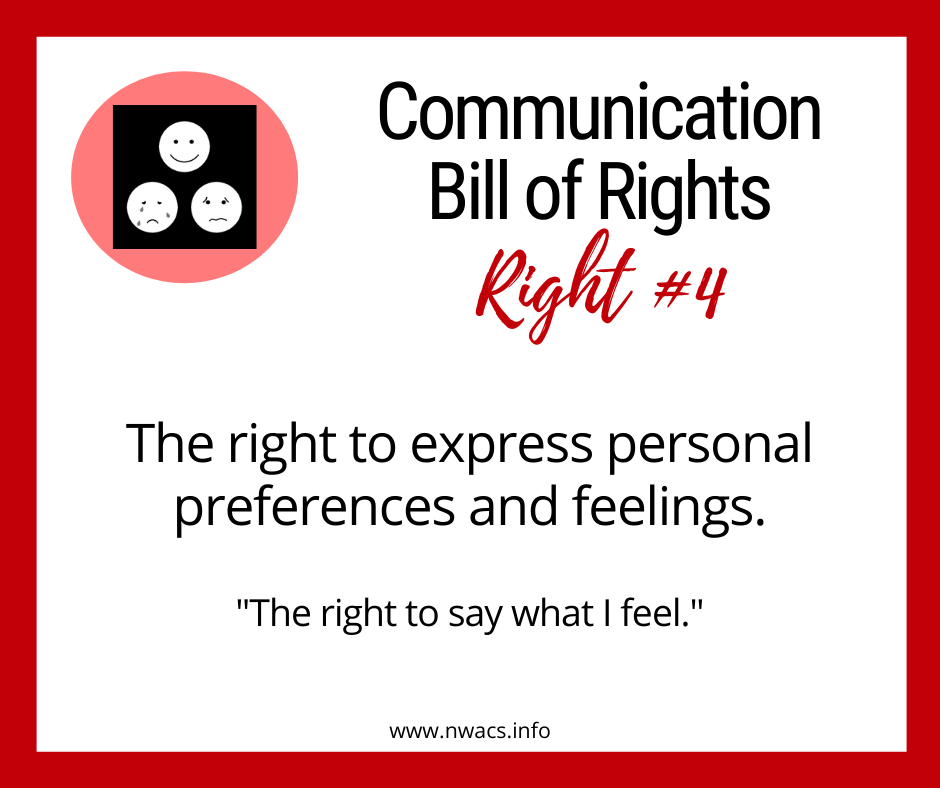Welcome back to Let's Talk AAC - a series of questions and topics for discussion. NWACS will occasionally post a question or topic along with some related information. We hope that you will join in the conversation by adding your experiences, resources, related research, etc. in comments so that we can all learn and benefit from each other's knowledge and experience.
reading time: 2 minutes
Right #4 of the Communication Bill of Rights reads: The right to express personal preferences and feelings.
I would prefer to have water.
I like listening to audiobooks better than watching TV.
I would rather go home.
I don’t like that.
People with complex communication needs often have limited opportunities to learn to communicate about their preferences and emotions. Communication partners often struggle to interpret - or misinterpret - the preferences and feelings of people with complex communication needs. The development of culturally appropriate emotional competence impacts development in many other areas, such as:
readiness to learn
communication
relationships
quality of life
participation in self-advocacy, vocations, and community
People with complex communication needs deserve to see, hear, experience, and learn about expressing personal preferences and feelings. We need to start early, and repeat often! We also need to teach them that they have the power (and right!) to advocate for their preferences and to communicate about their feelings. We may need to explore different ways to visually represent these concepts. We may need to break bigger concepts/conversations down into smaller pieces to help them think about and express their views on topics. The person (“thinker”) needs to be in control of expressing how they really feel/what they really think.
How do we promote this right?
For Communication Partners
Make sure that everyone is aware of the Communication Bill of Rights.
Inform and train communication partners on how they can best communicate and interact with AAC users.
Model and scaffold language to identify, label, discuss and reason about, and respond to preferences and emotions.
Talk about the feelings (and preferences) of characters during play, shared book reading, and/or while watching shows together.
When AAC users express personal preferences and/or feelings, acknowledge their communication. Whenever possible honor their preferences. When it is not possible, explain why and discuss alternatives.
For AAC Users
Help people with disabilities understand and advocate for their communication rights.
Provide culturally and linguistically responsive supports for AAC users to develop this skill area.
Provide AAC users with relevant vocabulary for labeling and talking about preferences and feelings.
Encourage AAC users to express their personal preferences and feelings.
Your Perspective
What would you add? Join the conversation by commenting below! Share your thoughts, ideas, strategies, resources, and/or tips for supporting AAC users' ability to express personal preferences and feelings.
References and related resources:
3 strategies to support choice and control for AAC users. AssistiveWare. https://www.assistiveware.com/learn-aac/3-practical-strategies-to-support-choice-control
Autism Level UP! supports and resources (https://autismlevelup.com/category/supports-resources/)
Marden, J. Using AAC to talk about emotions. AssistiveWare. https://www.assistiveware.com/blog/using-aac-to-talk-about-emotions
TalkingMats (https://www.talkingmats.com/)
Wilkinson, K; Na, JY; Rangel-Rodriguez, G; Sowers, DJ. (2021). Fostering Communication About Emotions: Aided Augmentative and Alternative Communication Challenges and Solutions. In BT Ogletree (Ed), Augmentative and Alternative Communication Challenges and Solutions (pp. 313-338). Plural Publishing, Inc.
Zangari, C. (2018, February 22). Dealing with Feelings: 5 Ways to Encourage Emotion-related Expression by AAC Learners. PrAACtical AAC. https://praacticalaac.org/praactical/dealing-with-feelings-5-ways-to-encourage-emotion-related-expression-by-aac-learners/
Related posts:






